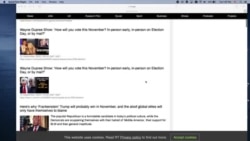On Sept. 3 the intelligence analysts at the U.S. Department of Homeland Security warned federal and state law enforcement that Russian actors were working to undermine faith in the U.S. election.
A redacted version of the evidence has been released to the public.
The unclassified document says there “high confidence,” that “Russian state media, proxies, state-controlled social media trolls are likely to promote allegations of corruption, system failure, and foreign malign interference to sow distrust in democratic institutions and election outcomes.”
The report specifically cited disinformation about the validity of mail balloting, which President Donald Trump has repeatedly disparaged with unproven assertions of widespread fraud and potential manipulation. The Washington Post fact checker called it a “fusillade of falsehoods” by Trump in a comprehensive examination of his claims.
Trump’s conservative backers, including the Heritage Foundation, a longtime vote-by-mail critic, have amplified his assertions about the potential for fraud, which are disputed by academics, other think tanks and past the experience of states where vote-by-mail is routine practice.
The U.S. assessment of Russian interference is based on the analysis by the DHS Cyber Mission Center in coordination with DHS agencies.
Russian Foreign Minister Sergey Lavrov responded to the U.S. charge of undermining vote-by-mail.
"Although, sometimes we still get surprised. I mean the recent statement, which voiced accusations against Russia that we are trying to abuse and utilize in the interests of one or another candidate the planned in the U.S mail in vote,” Lavrov said in remarks on Sept. 11.
“I was amazed by such an accusation because up until now I thought, that the mail in vote was a problem between president Trump, who categorically does not want to allow such voting, and the Democrats, who require spreading mail-in vote to a maximum.”
That is misleading.
The Russian state-owned media have played up the vote-by-mail and election fraud coverage, as shown in the R-T (Russia Today) coverage below.
Domestically, the topic also seems to be closely watched. Yandex.ru, the Russian search engine similar to Google, returns more than 9 million results for “mail in vote in the U.S.”; that number rises to more than 11 million when the key words are “mail in vote in the U.S. + Trump.”
Much of the interest is in news reports about Trump’s tweets or interviews on vote in mail. And the most dominant headlines focus on his opposition to vote-by-mail. The arguments vary from “the entire democratic system in the U.S. is falling apart” to the “vote-in-mail will turn the states deep blue,” that is, from Republican (Trump’s party – red) to Democrat (opponent Joe Biden’s – blue).
The Sept. 4 analysis published by the Russian state-owned Sputnik, for instance, predicts “an inevitable bloody November” if the U.S. votes by mail, because the voting results on the election night will be very different from the finals, which will include the ballots sent by mail. “The most likely scenario this will create resembles that of a cheap Hollywood civil war blockbuster,” the Sputnik report predicts before going into the apocalyptic details of the “bloody electoral drama unfolding in the U.S.” with the victor not Trump or Biden but a “total chaos” -- all because of vote in mail system.
Another most prevalent narrative in the Russian reports is the speculation about mass falsifications, the opportunity for which, according to the Russian experts, the mail voting presents to the U.S. Democratic Party, though they fail to explain how exactly the Democrats are more equipped to manipulate U.S. post offices.
While Russian state media are critical of mail balloting in the U.S., it’s getting carefully worded positive attention in Moscow.
The Russian Central Election Commission is reportedly “studying” the U.S. vote-by-mail system for its potential application domestically. On Sept. 11, Marsel Garayev, the election monitoring expert in Russia’s region of Tatarstan praised the U.S. vote-by-mail system as one of the world’s most successful time-tested democratic election tools.
A duality of narratives is not a novelty for the Russian state media. They frequently target different messaging to the U.S. public and domestic audiences, as Polygraph.info reported in this fact check about Black Lives Matter protests in major U.S. cities.
Lavrov dismissed the U.S. intelligence report.
“So, frankly speaking, we’ve got used to such attacks. In this case, just like in the case of poisonings in other countries of the world, we will go by concrete facts if they are presented to us,” he said.
The poisoning reference was in apparent response to German, U.S. and European allegations that leading opposition figure Alexey Navalny was confirmed to be poisoned with a Soviet-era nerve agent while on political travel in Siberia last month.
Navalny is recovering in Germany. The Kremlin has steadfastly disputed any involvement or that the agent Novichok was used.







